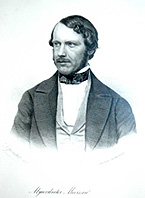Schrift: größer/kleiner
Inhaltsverzeichnis
Sie sind hier: WirRheinländer > english version > The Revolution of 1848 > The Frankfurt National Assembly
The 48 Revolution
The Frankfurt National Assembly
Although the Members of the Assembly had been allocated their seats in a free, equal, direct and secret ballot, the Frankfurt National Assembly did not remotely reflect the social structure of the population of the German Federation. More than 600, almost 75%, of the total 830 Delegates (585) and Deputies (245) were academically educated. 85 People's Representatives, namely 10%, belonged to the aristocracy. Among the parliamentarians there were 223 jurists, 124 teachers and 184 freelances, of whom 106 were lawyers. 312 members of the "Paulskirche" were judges, state or local officials. Together with the teachers and 49 university professors, the convention numbered 436 civil servants. Only 60 Members of the Assembly came from commerce and industry, among them 4 tradesmen, and just 46 from agriculture. Incidentally: women were neither allowed to stand for election, nor did they have the right to vote.
While small farmers were represented by a single Delegate, there were no workers at all. The professional and social composition of the Frankfurt National Assembly meant that it was a parliament unambiguously made up of academics, civil servants and jurists. So it was a democratically elected parliament of dignitaries, in which not the property-owning bourgeoisie, but rather it was the educated classes who set the tone.

Among the 35 Members of the Assembly from the Rhine Province, of whom several had been elected in more remote constituencies, the majority advocated a constitutional-parliamentarian monarchy. In Frankfurt Rhenish liberalism was represented in its various facets by big businessmen, such as Hermann von Beckerath (1801-1870), Gottfried Ludolf Camphausen (1803-1890) and Gustav Mevissen (1815-1899), as well as Franz Raveaux (1810-1851) and Karl Stedmann (1804-1878), who were joined by the Bonn historians Ernst Moritz Arndt (1769-1860) and Friedrich Christoph Dahlmann (1785-1860). Rhenish Catholicism was represented, among others, by the jurist August Reichensperger (1808-1895), as well as the Bonn theology professors Johann Wilhelm Joseph Braun (1801-1863), Franz Xaver Dieringer (1811-1876) and Franz Peter Knoodt (1811-1889). The Bonn theologian and professor of art history, Gottfried Kinkel (1815-1882), had a seat in the National Assembly as a radical Republican. However, several of the professors were not native Rhinelander.
Initially there was general acclaim for the first freely elected German parliamentarians, almost enthusiasm. However, the rights initially won also caused major problems for the Parliament. In March 1849 basic rights and the constitution of the German Reich were finally passed into law. The future Germany was intended to be a parliamentary monarchy and include German regions without Austria (greater German vs. smaller German solution). The crown of the Kaiser was to be worn by the King of Prussia. He turned it down, remarking that he did not want to wear a hoop of dirt and clay which was tainted with the low smell of the revolution. Furious arguments were the result. In many Rhenish towns there were violent conflicts, which all ended with the defeat of the insurgent inhabitants. Despite the breakdown of the first democratic movement in Germany, in the long run five important issues continued to show visible signs of the revolution:
-
Parliamentarianism;
- demands for basic and civil rights;
- the idea of social justice;
- the national concept;
- the European concept.
In the forties the desire to become a unified nation also intensified in the Rhineland, the desire for a united Germany. This was certainly influenced by the fact that France repeatedly called for the Rhine to be accepted as the boundary of its territory. The Rhine Song by a restaurant owner from Bad Godesberg named Becker ("They shall not have him, the free German Rhine, though they shout themselves hoarse for him like greedy ravens..") was intended to finally draw the Rhenish line under the debate. Years later, Becker's song was superseded by "die Wacht am Rhein" (The Watch on the Rhine), without having achieved any political success.


